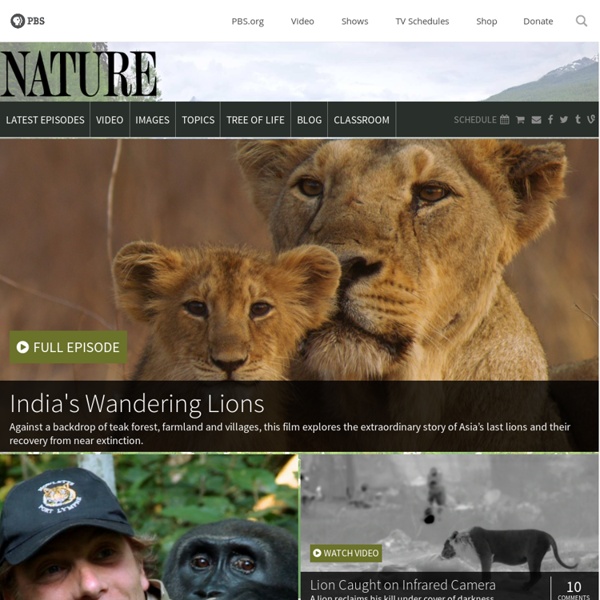



http://www.pbs.org/wnet/nature
Related: Science WebsitesWhat is this thing called science? As a scientist, Evelyn Fox Keller hated experiments. Today a professor emerita in the History of Science at MIT, she started out her scientific career in theoretical physics before jumping to molecular biology. What got her was the trivial volatility inherent in experimentation. “Someone could brush by the thermostat on the water bath, and a months’ work would be down the drain. You didn’t have control over it.” The methods of theoretical physics better suited her. The Gene Machine and Me It’s a fresh April morning in 2012 when I head to Connecticut to see a man about a genome. Not just any genome, but my own. I want to learn my own biological secrets. Nature Natural, physical, or material world and its phenomena Nature, in the broadest sense, is the natural, physical, or material world or universe. "Nature" can refer to the phenomena of the physical world, and also to life in general. The study of nature is a large, if not the only, part of science. Although humans are part of nature, human activity is often understood as a separate category from other natural phenomena.[1] Within the various uses of the word today, "nature" often refers to geology and wildlife.
Physical Review X Does Research on Foundations of Quantum Mechanics Fit into PRX’s Scope? October 24, 2014 The editors and Bill Poirier from Texas Tech University spotlight an original, thought-provoking paper by Hall, Deckert, and Wiseman on foundations of quantum mechanics, Phys. Rev. Passenger Arrival Lists General Information Our RecordsMicrofilm ResearchVisiting Our FacilityObtaining Copies Online DatabasesAccess to Archival Databases (AAD)Castle GardenEllis IslandAncestry.com Other ResourcesFamily History CentersOnline General Information Immigration records, also known as "passenger arrival records," can provide genealogical information including: a person's nationality, place of birth ship name and date of entry to the United States age, height, eye and hair color profession place of last residence name and address of relatives they are joining in the U.S. amount of money they are carrying, etc.
August 26, 2014: Do we live in a 2-D hologram? Press Release August 26, 2014 Do we live in a 2-D hologram? New Fermilab experiment will test the nature of the universe Unknown No Longer: A Database of Virginia Slave Names “Unknown No Longer: A Virginia Slave Name Database” was launched by the Virginia Historical Society in the fall of 2011. The database contains information about slaves, including records kept by slave owners in Virginia. According to the “Unknown No Longer” website at “This database is the latest step by the VHS to increase access to its varied collections relating to Virginians of African descent." Thanks to a generous grant from Dominion Resources and the Dominion Foundation, the Virginia Historical Society launched the project in January 2011. The database seeks to lift from the obscurity of unpublished historical records as much biographical detail as remains of the enslaved Virginians named in those documents.
Weird things start to happen when you stare into someone's eyes for 10 minutes Giovanni Caputo recruited 20 young adults (15 women) to form pairs. Each pair sat in chairs opposite each other, one metre apart, in a large, dimly lit room. Specifically, the lighting level was 0.8 lx, which Caputo says "allowed detailed perception of the fine face traits but attenuated colour perception."